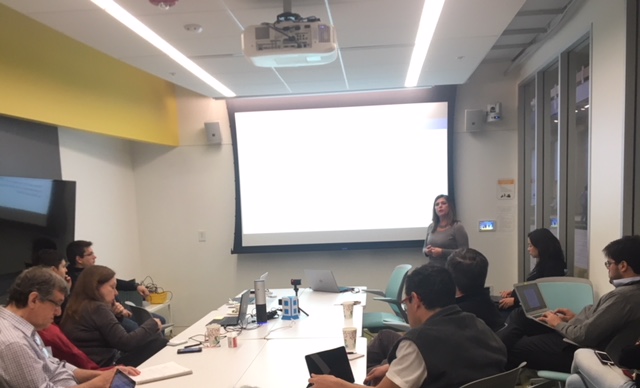Camila Barros, Visiting Student Researcher presents:
The effect of managers in the Educational Systems Management: A study of supervisory action in public high schools in São Paulo
Camila's paper is about educational policy, and the importance of reducing socioeconomic inequalities and promoting social justice, from the perspective of implementation. The research question is, "What are the management processes that result in the best outcomes, in order to coordinate the institutional levels of implementation and guarantee excellence and equity in the education systems?”
In order to attend answer this question examines the reforms led by the São Paulo´s State Secretariat of education since 1995, which defined the Regional Districts responsible for liaison and management of the national and state guidance of schools. We selected four district at São Paulo metropolitan region that presented the best performance in IDESP between 2011 and 2016. The results of the interviews with the Regional Managers, Supervisors and Pedagogical Coordinators will also be present, in order to investigate the role of the DRE and supervision in improving performance, while mid-level bureaucrats.
O artigo de Camila aborda a política educacional e a importância de reduzir as desigualdades socioeconômicas e promover a justiça social, desde a perspectiva da implementação. A questão da pesquisa é: "Quais são os processos de gestão que resultam nos melhores resultados, a fim de coordenar os níveis institucionais de implementação e garantir a excelência e a equidade nos sistemas educacionais?"
Para responder a esta questão, foram pesquisadas as reformas lideradas pela Secretaria de Estado de São Paulo desde 1995, que definiu os Distritos Regionais responsáveis pela ligação e gestão da orientação nacional e estadual das escolas.
Selecionou-se quatro Diretorias Regionais de Ensino que apresentaram melhor performance no IDESP entre 2011 e 2016 na região metropolitana de São Paulo. Também será apresentado o resultados das entrevistas aplicadas com os Dirigentes Regionais de Ensino, Supervisores e Coordenadores Pedagógicos das diretorias selecionadas, a fim de investigar o papel do DRE e a supervisão na melhoria do desempenho, enquanto burocratas de nível médio.
Éliton M Moura, Visiting Student Researcher presents:
Technological Innovation in Public Education: The Maker Movement and Free Fab Labs of São Paulo
Moura's research aims to contribute with elements on the formative process of teachers, projecting their capacity to work with maker education, under the influence of the Maker Movement. The qualitative data, besides the bibliographic survey on the Maker Movement for the education, came of an ethnographic research carried out throughout the years of 2016, 2017 and 2018 in the project Fab Lab Livre of São Paulo, that included observations in two makers space, also, of the application of a questionnaire to teachers of the municipal public education network and, finally, a focus group, with a partnership the Transformative Learning Technologies Laboratory of Stanford University, with educators who work in the American public schools with Maker Education. Anchored in Freire, Papert and Piaget, Moura's hypothesis is that technologies constitute one of the bases of contemporary social experience and that even though Brazilian schools have rarely incorporated activities makers into their practices, we think of the incorporation of technological elements in school culture is fundamental and requires the understanding of the responsibility of the school and teachers in the pedagogical use of these resources, as well as the consideration that the technologies can act as amplifier of the educational and consequently social capacities, so that the students become agents stimulated to the production and authorship. In this way, we assume that education is committed to transforming realities, empowering individuals, improving and creating spaces that socially and culturally value subjects so that they can question the world and make changes, challenge their reality and create solutions.
Inovação Tecnológica na Educação Pública: O Movimento Maker e o Fab Labs Livres de São Paulo
A pesquisa de Moura objetiva contribuir com elementos sobre o desenvolvimento autoral e o processo formativo de professores, projetando sua capacitação ao trabalho com educação maker, sob a influência do Movimento Maker. Os dados qualitativos procedem, além do levantamento bibliográfico sobre o Movimento Maker para a educação, de uma pesquisa etnográfica realizada ao longo dos anos de 2016, 2017 e 2018 no projeto Fab Lab Livre de São Paulo, que incluiu observações em dois espaços makers, da aplicação de um questionário à professores da rede pública municipal de educação e, ao final, um grupo focal, junto ao Transformative Learning Technologies Laboratory, da Universidade de Stanford, com educadores que atuam nas escolas públicas americanas com Educação Maker. Ancorada em Freire, Papert e Piaget, nossa hipótese é a de que as tecnologias constituem uma das bases da experiência social contemporânea e que mesmo que as escolas brasileiras tenham incorporado raríssimas vezes atividades makers às suas práticas, pensar a incorporação desses elementos tecnológicos na cultura escolar é fundamental e requer a compreensão da responsabilidade da escola e dos professores na utilização pedagógica desses recursos, bem como a ponderação de que as tecnologias podem atuar como amplificador das capacidades escolares e consequentemente sociais, proporcionado aos estudantes se tornarem agentes estimulados à produção autoral. Dessa forma, partimos do princípio de que a educação tem o compromisso de transformar realidades, empoderar sujeitos, melhorar e criar espaços que valorizam social e culturalmente os sujeitos para que possam questionar o mundo e realizar mudanças, desafiando sua realidade e criando soluções.


